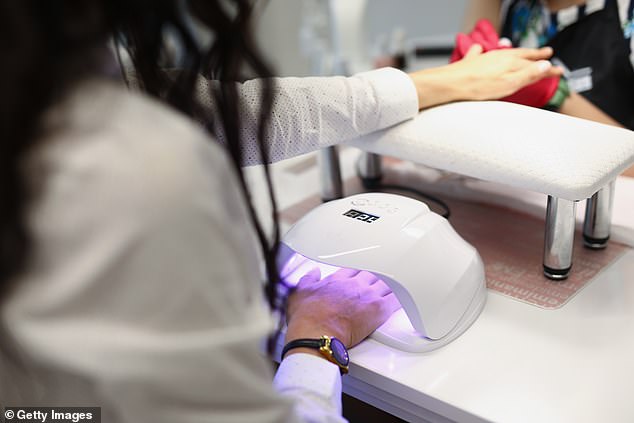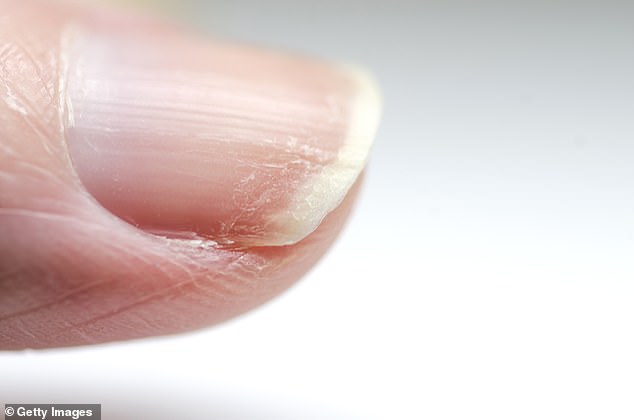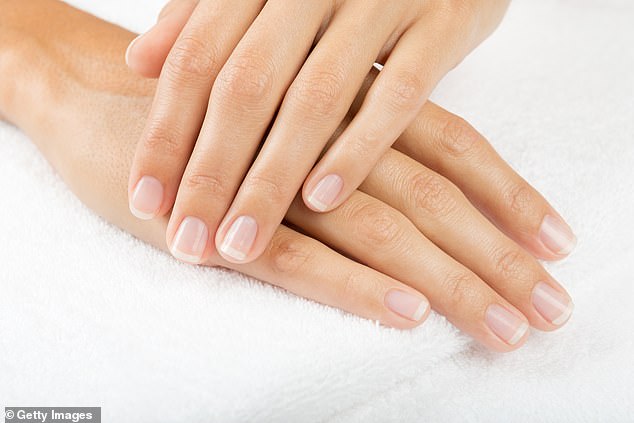Daily Mail journalists select and curate the products that feature on our site. If you make a purchase via links on this page we will earn commission – learn more
As a nation we’ve never been more obsessed with our nails, with dedicated salons proliferating on the high street and the UK nail industry bringing in £271m revenue in 2025, according to Statista.
However, along with all those manicures and nail art can come serious damage to your nails, from weak, easily broken nails to peeling and flaking. And you don’t even need to be indulging in monthly gels to suffer the woes of rubbish nails; for some of us even our bare, untouched nails are dry and fragile (not ideal if you’re going to the beautiful natural nails look).
So what causes weak nails, and is there anything you can do about it? We spoke to three top nail experts to find out…
What are the biggest causes of weak, breakable nails?
Many of us will have noticed our nails’ condition getting considerably worse after in-salon treatments, which often prompts a vicious cycle, as you have more polish applied to cover up the dodgy nails underneath. ‘Gel manicures can weaken nails because of the preparation and removal process,’ explains Margaret Dabbs, chief executive and founder of her eponymous nail clinic in London. ‘Over-buffing, acetone remover and scraping off product all strip the nail of natural oils and damage the keratin layers. This leaves nails thin, dry and prone to peeling.’

Gel manicures can weaken nails because of the preparation and removal process
However, it’s not just manicures that can lay waste to your nails. ‘Weak nails can be caused by a combination of factors,’ says consultant dermatologist Dr Vani Agarwal. These can include ‘repeated wetting and drying’, as well as ‘exposure to household detergents and solvents.’ Other common issues, according to Gaelle Lebrat-Personnaz, chief executive and co-founder of Manicurist, are ‘nail biting, or using your nails as tools’ (for opening tins etc).
As for diet, Dr Agarwal says this plays an important role, ‘however, true nutritional defiencies are relatively rare in the UK.’ That’s not to say you shouldn’t focus on a varied and rich diet, plus plenty of water – undoubtedly our hair, skin and nails all benefit when there’s plenty of nutrients going into our bodies.
What causes nails to peel?
Have you ever noticed your nails breaking down into layers, with the top ones peeling or flaking off? It’s a sign of dehydrated nails, and ‘occurs when the layers of the nail plate loose moisture and separate,’ explains Dr Agarwal. Again, the same triggers apply: ‘overexposure to water, harsh nail products and mechanical trauma from frequent filing and buffing’ are the main culprits. Dr Agarwal adds ‘This issue can be very common in people who wash their hands frequently for work.’
Why do nails get worse as you get older?
Dabbs explains: ‘As we age, our nails often become drier, more brittle and slower to grow. This is largely because the natural cell turnover in the nail bed decreases and the flow of blood and nutrients to the extremities is not as efficient as it once was. Nails can also lose their smoothness and begin to develop ridges or discolouration. Hormonal changes, reduced collagen production and general wear and tear over time also play a part.’

Blood circulation to the nail matrix, where the nail forms, decreases as we get older.
If that all sounds a bit depressing though, don’t worry. As Lebrat-Personnaz says, ‘with the right products and routine, it’s absolutely possible to maintain strong, healthy nails at any age.’
What steps can you take to strengthen fragile nails?
If you’re a manicure addict, the advice you probably don’t want to hear is that taking a break from regular salon appointments will do your nails good. However, the truth is it will ‘let your nails breathe,’ says Lebrat-Personnaz, giving them a chance to regrow and repair. She also recommends daily hydration of the nails with nourishing oils, and using a nourishing base coat when you do apply polish.
Dabbs says when you have gel manicures, you should always have them removed professionally, as an expert will know how to limit damage when taking the product off. She also says ‘You should be ditching emery board nail files and swapping for a good quality crystal file, which promotes healthy growth and ensures that the nails do not split or break.’
Dr Agarwal gives the following tips:
Wear cotton-lined gloves while washing or cleaning.Moisturise your hands and nails daily. ‘I recommend glycerin-based creams and oils, as it’s an excellent humectant so can help hydrate the nail plate,’ she says.Keep your nails cut short.Regularly apply Vaseline to the cuticles to lock in moisture. 
Lifestyle changes are key when it comes to improving the condition of your nails.
Should you take supplements to improve your nails?
There was no conclusive verdict on nail supplements from the experts we spoke to. Lebrat-Personnaz suggests you take supplements including biotin, zinc or plant-based keratin to strengthen fragile nails. Dr Agarwal, however, says ‘My advice would be to focus on a balanced diet rich in protein, iron and fresh fruit and vegetables. Supplements rarely transform nail health unless you have a true deficiency in a particular vitamin or mineral, although there is some evidence behind biotin supplements (vitamin B7) when taken consistently to help strengthen brittle nails.’
When should you seek professional help?
All our experts agree that if your nails are persistently weak or breaking, it’s a good idea to seek help from an expert-led clinic or dermatologist, to check that there isn’t an underlying issue that needs to be addressed. ‘There are many conditions such as psoriasis, lichen planus and anaemia, as well as fungal nail infections, which can be linked to poor nails and effectively treated when help is sought,’ says Dr Agarwal.
Products to help weak nails
